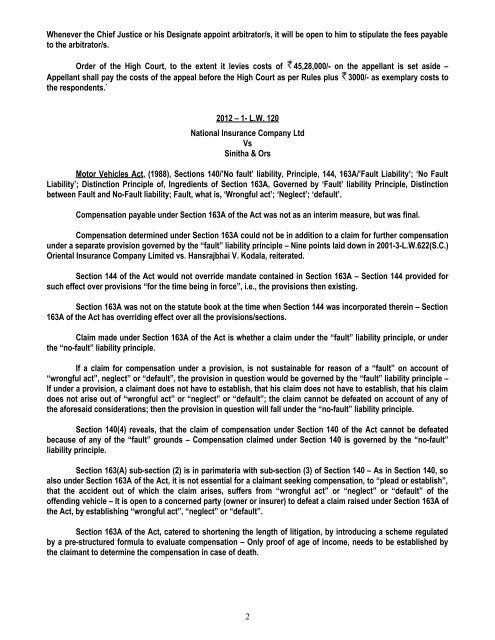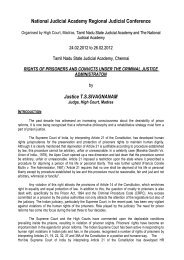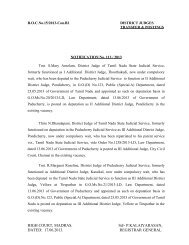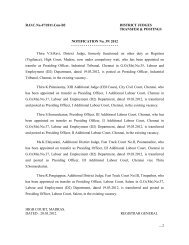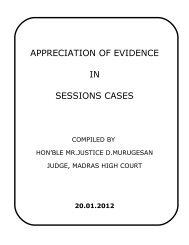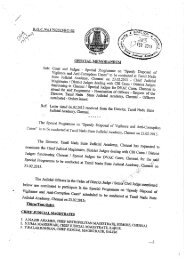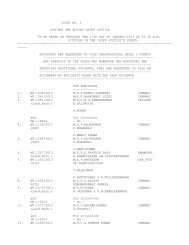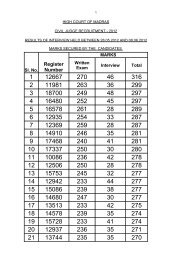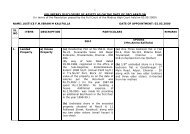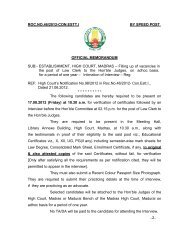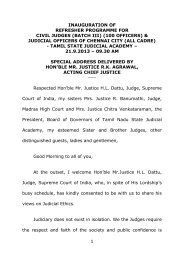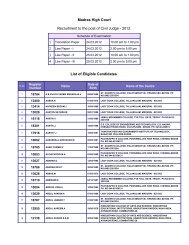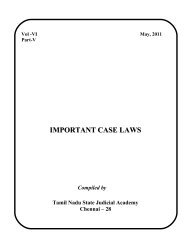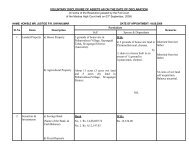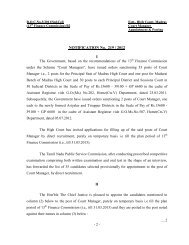May - Madras High Court
May - Madras High Court
May - Madras High Court
Create successful ePaper yourself
Turn your PDF publications into a flip-book with our unique Google optimized e-Paper software.
Whenever the Chief Justice or his Designate appoint arbitrator/s, it will be open to him to stipulate the fees payable<br />
to the arbitrator/s.<br />
Order of the <strong>High</strong> <strong>Court</strong>, to the extent it levies costs of 45,28,000/- on the appellant is set aside –<br />
Appellant shall pay the costs of the appeal before the <strong>High</strong> <strong>Court</strong> as per Rules plus 3000/- as exemplary costs to<br />
the respondents.`<br />
2012 – 1- L.W. 120<br />
National Insurance Company Ltd<br />
Vs<br />
Sinitha & Ors<br />
Motor Vehicles Act, (1988), Sections 140/’No fault’ liability, Principle, 144, 163A/’Fault Liability’; ‘No Fault<br />
Liability’; Distinction Principle of, Ingredients of Section 163A, Governed by ‘Fault’ liability Principle, Distinction<br />
between Fault and No-Fault liability; Fault, what is, ‘Wrongful act’; ‘Neglect’; ‘default’.<br />
Compensation payable under Section 163A of the Act was not as an interim measure, but was final.<br />
Compensation determined under Section 163A could not be in addition to a claim for further compensation<br />
under a separate provision governed by the “fault” liability principle – Nine points laid down in 2001-3-L.W.622(S.C.)<br />
Oriental Insurance Company Limited vs. Hansrajbhai V. Kodala, reiterated.<br />
Section 144 of the Act would not override mandate contained in Section 163A – Section 144 provided for<br />
such effect over provisions “for the time being in force”, i.e., the provisions then existing.<br />
Section 163A was not on the statute book at the time when Section 144 was incorporated therein – Section<br />
163A of the Act has overriding effect over all the provisions/sections.<br />
Claim made under Section 163A of the Act is whether a claim under the “fault” liability principle, or under<br />
the “no-fault” liability principle.<br />
If a claim for compensation under a provision, is not sustainable for reason of a “fault” on account of<br />
“wrongful act”, neglect” or “default”, the provision in question would be governed by the “fault” liability principle –<br />
If under a provision, a claimant does not have to establish, that his claim does not have to establish, that his claim<br />
does not arise out of “wrongful act” or “neglect” or “default”; the claim cannot be defeated on account of any of<br />
the aforesaid considerations; then the provision in question will fall under the “no-fault” liability principle.<br />
Section 140(4) reveals, that the claim of compensation under Section 140 of the Act cannot be defeated<br />
because of any of the “fault” grounds – Compensation claimed under Section 140 is governed by the “no-fault”<br />
liability principle.<br />
Section 163(A) sub-section (2) is in parimateria with sub-section (3) of Section 140 – As in Section 140, so<br />
also under Section 163A of the Act, it is not essential for a claimant seeking compensation, to “plead or establish”,<br />
that the accident out of which the claim arises, suffers from “wrongful act” or “neglect” or “default” of the<br />
offending vehicle – It is open to a concerned party (owner or insurer) to defeat a claim raised under Section 163A of<br />
the Act, by establishing “wrongful act”, “neglect” or “default”.<br />
Section 163A of the Act, catered to shortening the length of litigation, by introducing a scheme regulated<br />
by a pre-structured formula to evaluate compensation – Only proof of age of income, needs to be established by<br />
the claimant to determine the compensation in case of death.<br />
2


